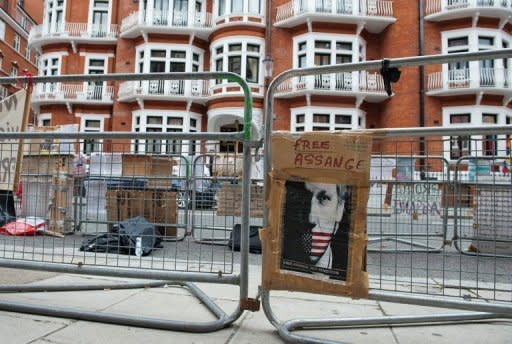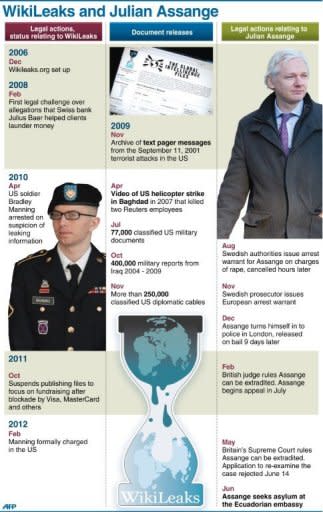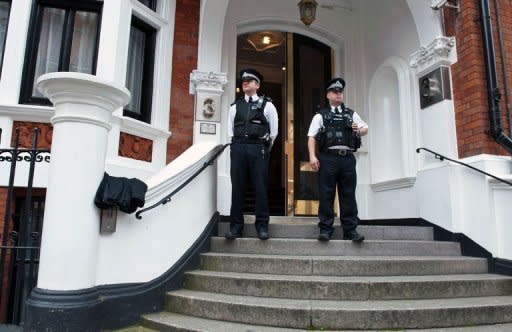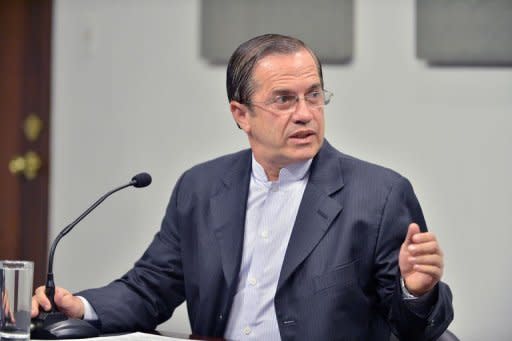Ecuador to give Assange asylum decision Thursday
Ecuador said it would announce its decision on granting asylum to WikiLeaks founder Julian Assange on Thursday, and slammed Britain for threatening to storm Quito's mission in London to retrieve him. Assange, an Australian national, has been holed up in Ecuador's London embassy since June. Ecuador's Foreign Minister Ricardo Patino said it would be "unacceptable" if British police were to force their way into the mission. The former hacker is wanted for questioning over sexual assault allegations in Sweden, but says he fears deportation to the United States, which may seek to try him for his website's release of a trove of secret documents. Patino said Wednesday that Ecuador "has made a decision" on Assange and will announce it Thursday at 7:00 am (1200 GMT). The foreign minister had earlier presented a report on the case to Ecuadoran President Rafael Correa. Patino rounded on Britain for threatening to take 41-year-old Assange into custody by force and warned such a move would not be tolerated. "Today, we received from the United Kingdom an express threat, in writing, that they could storm our embassy if Ecuador does not hand over Julian Assange" the foreign minister told reporters. "Ecuador rejects in the strongest terms the explicit threat made in Britain's official communication," he said. "The position taken by the government of Great Britain is unacceptable, both from the political and the legal point of view," the foreign minister said. He warned that entering the embassy without authorization "would be a flagrant violation of the Vienna Convention" on diplomatic relations. WikiLeaks on Thursday condemned the British threat to raid the Ecuador embassy as a "hostile and extreme" assault on asylum-seekers. "WikiLeaks condemns in the strongest possible terms the UK's resort to intimidation," it said in a statement. "A threat of this nature is a hostile and extreme act, which is not proportionate to the circumstances, and an unprecedented assault on the rights of asylum-seekers worldwide. Assange took refuge at Ecuador's embassy in London on June 19 to avoid extradition to Sweden, which he claims plans to eventually surrender him to US authorities. But even if the asylum request is granted, it is unclear whether Assange will be allowed to leave, as British police were waiting outside the embassy ready to arrest him for breaching the terms of his bail granted in 2010. "The UK has a legal obligation to extradite Mr Assange to Sweden to face questioning over allegations of sexual offenses and we remain determined to fulfill this obligation," a British Foreign Office spokesman said. Assange had embarked on a marathon round of court battles, but finally exhausted all his options under British law in June when the Supreme Court overturned his appeal against extradition. Quito had said it was reviewing the sexual misconduct allegations as it weighed his asylum request. Assange maintains he had consensual sex with the alleged Swedish victims. Assange's WikiLeaks website infuriated Washington when it released hundreds of thousands of secret war reports from Iraq and Afghanistan and countless US embassy cables containing unguarded and at times embarrassing remarks by a number of world leaders and diplomats. Correa has said that the mere possibility that Assange could face capital punishment in the United States could be reason enough for his government to grant the activist's asylum petition. The leftist Correa has often been at odds with Washington and has expressed support for Assange, offering him asylum as far back as 2010 before later backing off. Assange's mother and former Spanish judge Baltasar Garzon, who is helping to represent him, recently traveled to Ecuador to argue on his behalf. Offering shelter to a high-profile figure like Assange -- hailed as a whistleblower by his supporters -- could help Correa push back against critics who accuse him of clamping down on press freedom. Britain's Foreign Office later released a statement saying it hoped a "mutually acceptable" solution could still be found, but warned it would do all it could to extradite Assange. "We have an obligation to extradite Mr Assange and it is only right that we give Ecuador the full picture," the spokesman said of the letter sent by Britain to Quito. "Throughout this process, we have drawn the Ecuadorans' attention to relevant provisions of our law." The law which Britain is threatening to invoke is the Diplomatic and Consular Premises Act of 1987, which allows it to revoke the diplomatic immunity of an embassy on British soil. WikiLeaks spokesman Kristinn Hrafnsson told AFP that the threat to storm the embassy was "extremely serious" and said that the group's legal team refuted its legality. Around 10 police were present outside the embassy late Wednesday, according to an AFP reporter, while two more could be seen inside the lobby itself.



![Demonstrators hold signs reading "We are sovereign [state], not a colony" as they shout slogans outside the British Embassy in Quito on August 15, 2012](https://s.yimg.com/ny/api/res/1.2/Hjw60Zw753IPr6wLyfIczw--/YXBwaWQ9aGlnaGxhbmRlcjt3PTk2MDtoPTYzOQ--/https://media.zenfs.com/en_sg/News/AFP/photo_1345096711942-9-0.jpg)


